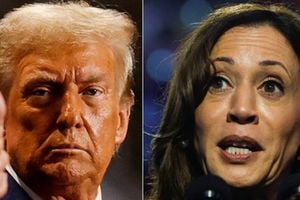
US Vice President Kamala Harris (left) in Milwaukee, Wisconsin on August 20, 2024 and former US President Donald Trump in Bedminster, New Jersey on August 15, 2024.
US presidential elections often yield unexpectedly tight results, even when the political landscape seems to favour one candidate over the other.
This reflects the deeply polarised nature of American politics, where two leading candidates can have starkly different approaches values, and visions for the future yet still compete closely for votes.
Let’s examine the major contrasts between the two candidates and explore the factors that make this election more competitive than it might appear.
Stark contrast
Vice President Kamala Harris and former President Donald Trump represent two fundamentally different approaches to leadership.
Harris has spent her career in public service working her way up from San Francisco’s District Attorney to California’s Attorney-General, then to the US Senate, and now Vice President. Her approach centres on progressive policy reforms in areas like healthcare, social equity, and climate change.
Harris is known for her emphasis on collaboration, a balanced communication style, and commitment to progressive taxation, criminal justice reform, and reproductive rights. She advocates for workers’ rights and is viewed as pragmatic and empathetic, often framing her policies within the ideals of inclusivity and justice.
In contrast, Trump emerged from a business and entertainment background, notably as a real estate developer and host of The Apprentice. Trump’s political career began in 2016 when he won the presidency as a political outsider.
His administration focused on business deregulation conservative values, and an “America First” policy, with an emphasis on nationalism and economic self-reliance. Known for a combative and direct style, he maintains strong loyalty among his base, often engaging supporters through rallies and social media, portraying himself as a leader against the political establishment.
This sharp contrast in backgrounds and leadership styles sets the stage for a highly polarised election. Despite these profound differences, the election remains close.
American politics are intensely polarised, with voters often pledging strong loyalty to one party regardless of the specific candidate or issues. This loyalty ensures a solid voter base for each party, making the election competitive even if one candidate might otherwise appear more favourable. This trend of party-aligned voting drives a close contest, as many voters prioritise party ideology over candidate character.
Electoral college
In the United States, the Electoral College ultimately decides the presidency, not the popular vote. Candidates focus on winning key battleground states where electoral votes are contested. This means a candidate could lose the national popular vote but still win the presidency, as seen in 2016 when Hillary Clinton won the popular vote, but Trump won the Electoral College.
This system contributes to the close nature of US presidential elections, allowing the outcome to hinge on a few swing states. States like Pennsylvania, Michigan, Wisconsin, Arizona, Nevada, and Georgia have emerged as critical battlegrounds. They lack consistent political leanings, often alternating between Democratic and Republican choices depending on the election.
Both candidates target these states heavily with campaign resources, keeping the election tight as each seeks to sway undecided voters and appeal to moderate or independent voters in these regions.
As the American population diversifies, so do voter concerns, particularly around issues like healthcare, immigration, and economic security. Harris, the daughter of immigrants, champions inclusive immigration reform, supporting a welcoming approach that contrasts with Trump’s emphasis on strict border policies and economic nationalism. Each candidate appeals to different demographic groups, leading to a close race as the parties attempt to capture the attention of various communities.
The US media amplifies the perception of a competitive race, often presenting elections as “horse races” to maintain viewer engagement. News networks are generally polarised, with Fox News leaning toward Trump and MSNBC supporting Harris, reflecting a divided media environment that influences public perception and intensifies the sense of a close election.
This portrayal can increase partisan excitement and voter turnout, further contributing to the tight competition.
Trump critics argue that a second term could bring significant consequences for US democracy and international relations, raising concerns. Trump has faced scrutiny for his actions and rhetoric, which critics argue have undermined democratic norms.
His dismissal of media scrutiny as “fake news”, his challenge of election results, and his involvement in the events leading up to the January 6 Capitol insurrection have all raised red flags for those who prioritise democratic principles, like the peaceful transfer of power. These actions worry critics who fear a Trump presidency may erode essential democratic safeguards.
Trump’s direct and often controversial public messaging has been a point of criticism. He has used social media and rallies to attack political opponents, critics, and even entire communities, intensifying polarisation within the United States.
This approach has left American society divided across racial, socioeconomic, and political lines, with concerns that another Trump term would deepen these divides, further damaging social cohesion and public trust in government.
Trump’s “America First” stance has led to the US withdrawing from several global agreements and re-evaluating international alliances.
His administration exited the Paris Climate Agreement, imposed tariffs on allies, and questioned the importance of Nato. This more isolationist approach could impact America’s global relationships, hindering the country’s ability to work collaboratively with allies on issues like climate change, global security, and public health crises.
Trump currently faces multiple legal battles, including investigations into business practices, election conduct, and the handling of classified documents. A re-election could mean a president involved in unprecedented legal challenges, which some argue could distract from governance and erode the integrity of the presidency.
These legal issues raise ethical concerns for critics who fear that a Trump presidency would further erode public confidence in government.
Harris’s experience, policy priorities, and approach to leadership suggest several ways that her administration could positively impact the US and the world.
Strengthen democracy
Harris has demonstrated a commitment to democratic principles and collaboration across party lines. She emphasizes respect for democratic institutions, transparent governance, and the rule of law. Her approach to building bipartisan solutions on key issues could help bridge the current political divide and strengthen faith in democracy.
Progressive policies
Harris’s agenda includes expanding healthcare, supporting working families, addressing racial and economic inequality, and increasing access to affordable education. She also prioritizes environmental policies that promote green energy and reduce carbon emissions, aligning her with global climate goals.
International diplomacy
Harris is committed to re-engaging with international organisations like Nato and the United Nations, advocating for collaboration on global challenges such as climate change and security. Her approach to foreign policy emphasizes diplomacy, in contrast to Trump’s more unilateral approach, which could strengthen ties with allies and enhance.
Inclusivity
As a woman of Black and South Asian descent, Harris’s leadership reflects America’s diversity. Her empathetic and inclusive communication style fosters unity and reflects the multicultural reality of modern America. This approach can inspire other countries to value diversity in leadership and promote civil political discourse.
Public health
Harris has shown support for improving public health infrastructure and preparing for future pandemics. Her policies prioritise funding for healthcare systems and support for global health initiatives, benefiting the United States and the world in preventing and responding to health crises.
Immigration
Harris’s background and advocacy for immigration reform reflect her commitment to a balanced, humane approach that addresses border security and provides pathways for immigrants and refugees. Her policies could help the United States address labor needs, support Dreamers, and collaborate with neighbouring countries to mitigate the root causes of migration.
In a race marked by such clear contrasts, Americans are presented with a consequential choice that extends beyond domestic borders. Early voting has shown enthusiasm on both sides, and the outcome will depend on each candidate’s ability to mobilise voters in key states.
Although polling may give Harris a slight edge, ultimately, it is the votes cast that will shape the country’s future direction. As the world watches, this decision holds the potential to either unify or further divide America, with implications felt well beyond its borders.











